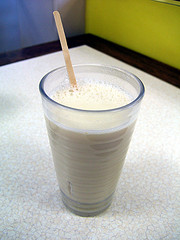
flickr.com/oxborrow
How many times have you heard this line: “Soy beans are good for your health”? It’s spoken like a mantra, and with good reason, because soy beans are more than just a great source of protein.
The mighty soy bean contains isoflavones, gensitein, daidzen, and a generous amount of antioxidants. Each of these substances contributes to the bean’s health-promoting goodness.
There is one compound found in the soy bean that is generating a great deal of interest in the scientific and medical circles. That compound is soy bean lecithin, or phosphatidylcholine (PC). It is a type of lipid that is found in all cells of all living organisms in the world. PC forms a major component of the cell membrane, along with cholesterol and glyceride.
If this lecithin substance can be found in every cell, then shouldn’t we already have it? Why do we need to take alternate sources such as soy bean lecithin? The answer is simple: this compound is so vital to our bodies that we cannot afford to have inadequate supply.
Soy bean lecithin was discovered in the 1930s when the compound was extracted from sludge, a byproduct of soybean oil processing. Of course, decades before then, lecithin was already found in egg yolk. Most of the commercial lecithin sold on the market at that time was egg lecithin.
With the emergence of soy bean lecithin, a shift also occurred. Lecithin that is derived from plants, including soy bean lecithin, is regarded safer to use than those extracted from animals. Animal lecithin is often excreted by the kidney, which contains toxins and other harmful substances. Therefore, soy bean lecithin came to replace egg lecithin as the major source of this compound.
Soy bean lecithin is composed of three types of phospholipids: phosphatidylcholine (PC), phosphatidylinositol (PI) and phosphatidylehtanolamine (PE). The most important component is PC which, when synthesized, becomes choline. This essential nutrient is desperately needed by the body.
Phosphatidylcholine contributes to the structural integrity of cells. It is a major component of the cell membrane and helps to facilitate the movement of fluids in and out of the cell, and eases cell signaling or communication. PC is particularly important in such vital organs as the liver and the brain.
Choline helps synthesize acetylcholine, a neurotransmitter that is responsible for much of our cognitive functions. This unique function of choline has led many scientists to believe that supplementing our choline supply by taking soy lecithin may aid in brain related disorders including dementia, memory loss, Alzheimer’s disease and many others.
In the liver, phosphatidylcholine acts as an emulsifying agent. It is found in bile, where it keeps essential fatty acids, stabilizes them and protects them from harmful toxins also contained in the bile.
Phosphatidylcholine also helps to disperse cholesterol in the blood, and stops cholesterol sticking to the walls of the arteries. Thus, it may have a positive effect on the thickening of the arteries, a condition commonly known as atherosclerosis. PC can also help to prevent the symptoms of high blood pressure.
For overall health and wellness, remember your soy bean mantra and make them a regular part of your diet.
Tagged with: lecithin benefits • lecithin from soya
Filed under: Lecithin